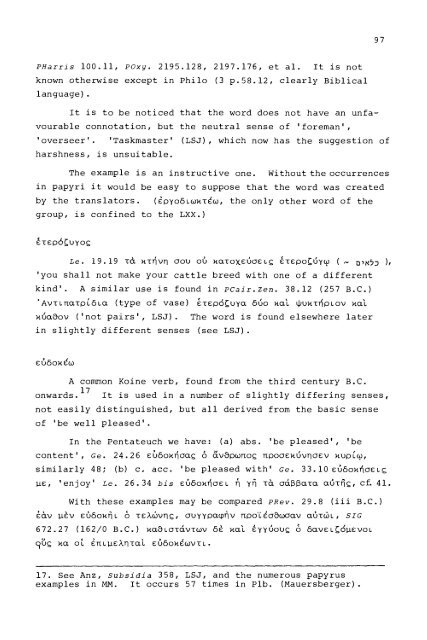A Lexical Study of the Septuagint Version of the Pentateuch
A Lexical Study of the Septuagint Version of the Pentateuch
A Lexical Study of the Septuagint Version of the Pentateuch
You also want an ePaper? Increase the reach of your titles
YUMPU automatically turns print PDFs into web optimized ePapers that Google loves.
PHarris 100.11, POxy. 2195.128, 2197.176, et al. It is not<br />
known o<strong>the</strong>rwise except in Philo (3 p.58.12, clearly Biblical<br />
language).<br />
It is to be noticed that <strong>the</strong> word does not have an unfa<br />
vourable connotation, but <strong>the</strong> neutral sense <strong>of</strong> 'foreman',<br />
'overseer'. 'Taskmaster' (LSJ), which now has <strong>the</strong> suggestion <strong>of</strong><br />
harshness, is unsuitable.<br />
The example is an instructive one. Without <strong>the</strong> occurrences<br />
in papyri it would be easy to suppose that <strong>the</strong> word was created<br />
by <strong>the</strong> translators. (έργοδιωκτέω, <strong>the</strong> only o<strong>the</strong>r word <strong>of</strong> <strong>the</strong><br />
group, is confined to <strong>the</strong> LXX.)<br />
έτερόζυγος<br />
Le. 19.19 τα κτήνη σου ού κατοχεύσεις έτεροζύγω ( ~ D>NÎO )><br />
'you shall not make your cattle breed with one <strong>of</strong> a different<br />
kind'. A similar use is found in PCair.zen. 38.12 (257 B.C.)<br />
Άντιπατρίδια (type <strong>of</strong> vase) έτερόζυγα δύο και ψυκτήριον κα!<br />
κύαθον ('not pairs', LSJ). The word is found elsewhere later<br />
in slightly different senses (see LSJ).<br />
εύδοκέω<br />
A common Koine verb, found from <strong>the</strong> third century B.C.<br />
17<br />
onwards. It is used in a number <strong>of</strong> slightly differing senses,<br />
not easily distinguished, but all derived from <strong>the</strong> basic sense<br />
<strong>of</strong> 'be well pleased'.<br />
In <strong>the</strong> <strong>Pentateuch</strong> we have: (a) abs. 'be pleased', 'be<br />
content', Ge. 24.26 ευδοκήσας ο άνθρωπος προσεκύνησεν κυρίω,<br />
similarly 48; (b) c. acc. 'be pleased with' Ge. 3 3.10 ευδοκήσεις<br />
με, 'enjoy' Le. 26.34 bis ευδοκήσει ή γη τα σαββατα αυτής, cf. 41.<br />
With <strong>the</strong>se examples may be compared PRev. 29.8 (iii B.C.)<br />
εάν μέν εύδοκήι ό τελώνης, συγγραφήν προ'ίέσθωσαν αύτώι, SIG<br />
672.27 (162/0 B.C.) καθιστάντων δέ και έγγύους 6 δανειζόμενοι<br />
Cfvc κα οί έπιμεληταί εύδοκέωντι.<br />
17. See Anz, subsidia 358, LSJ, and <strong>the</strong> numerous papyrus<br />
examples in MM. It occurs 57 times in Plb. (Mauersberger).

















